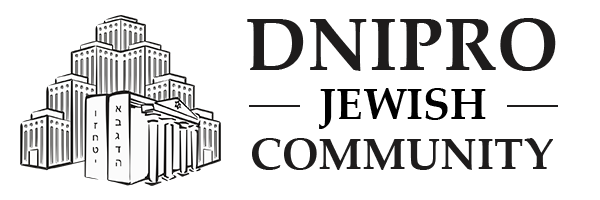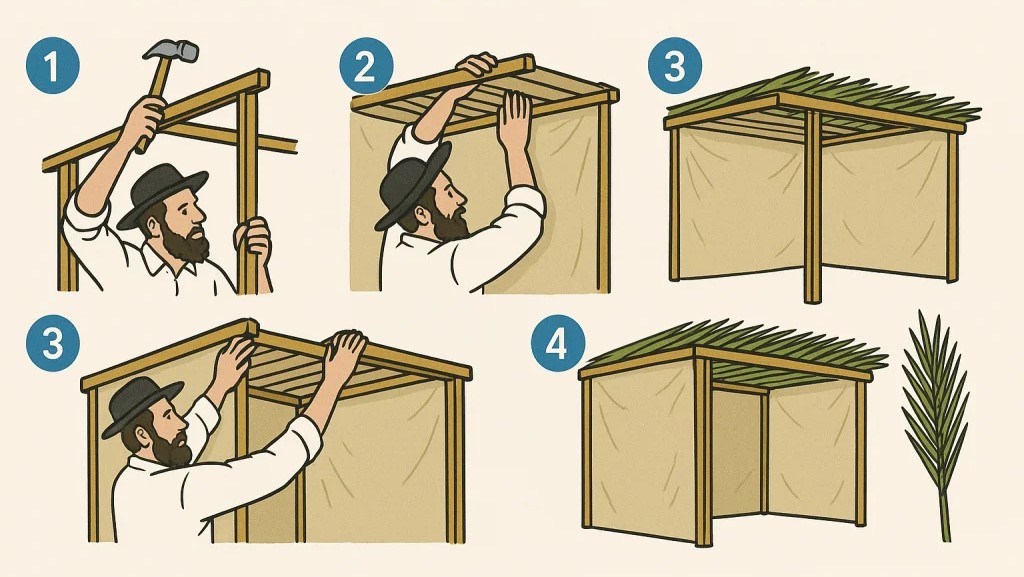One of the most important commandments of the Sukkot holiday is the commandment of dwelling in a “booth.” One should be in the sukkah for as much time as possible, for it is intended to replace one’s permanent home for the duration of the holiday. One must eat and drink, study Torah, meet with friends, rejoice and be merry in it, for the Torah calls the period of Sukkot the “time of our joy.”
Tradition prescribes that every Jew take part in building a sukkah; moreover, the importance of having a sukkah for every Jewish family is emphasized. The booth can be built near one’s house and even on a balcony. Jews in medieval cities, where there was a great shortage of land within the city walls, specifically built houses with flat roofs in order to build a sukkah on them for the holiday (this can be observed in many European cities, for example, in the center of Lviv – if you see a house with a flat roof, you can be sure it was built by Jews for this very purpose).
How to build a sukkah for your family you can learn from this short video.
We also offer you to familiarize yourself with a brief overview of the laws of the sukkah.
The commandment regarding the Sukkot holiday states: “You shall dwell in booths for seven days… so that your generations shall know that I made the children of Israel dwell in booths when I brought them out of the land of Egypt” (Vayikra, 23:42-43).
Every Jew is obliged to take part in building the sukkah (booth): preparing the schach (branches for the roof), assembling the walls, and decorating the sukkah (this is done with particular pleasure by children).
The booth must stand under the open sky (there should be no roof or branches of a living tree above the schach). Building a booth on someone else’s land is only permitted with the owner’s permission.
The walls of the booth must be strong and stable enough that they do not move from the wind. They must stand on the ground (or be raised above it by no more than 24 cm). A sukkah should have four walls, but if this is impossible, three are sufficient.
For the schach, plants and their parts are used: branches, leaves, twigs, vines. A living plant whose roots go into the ground cannot serve as schach. It is best to use tree branches, bamboo stalks, or reeds. Wooden parts with a small cross-section (slats, planks) can also be used as schach. The support for the schach is provided by beams, which must also meet all the requirements for schach.
The schach must be dense: the shade from it in the booth must be noticeably greater than the openings through which the sun’s rays penetrate. Even if in the total calculation the area of shade exceeds the area lit by the sun, care must be taken that there are no gaps in the schach wider than 24 cm.
The Chabad custom is not to decorate the sukkah.
“You shall dwell in booths for seven days” – throughout the entire Sukkot holiday, one should live in the booth, meaning to turn the sukkah into one’s home: eat, drink, study Torah, rest, and host guests.
Throughout the week of the holiday, the space of the booth becomes, as it were, a receptacle for the commandment. Therefore, one cannot enter it in a dirty state or bring in soiled items; until the end of Simchat Torah, the boards of the booth cannot be used for anything, and after the holiday, when the hut is finally dismantled – one cannot step on the building materials or use them for unseemly purposes.
By law, throughout the seven days, it is forbidden to eat and drink outside the booth. This does not apply to water, although it is desirable to quench one’s thirst only in the booth. The meals of the first and second evenings are a special commandment. Even if a person has suffered – G-d forbid! – a severe misfortune or is ill, nevertheless, he is obliged during the first two nights to eat at least a small piece of bread in the booth. The same applies to bad weather. If it is raining heavily enough to spoil the food, and there is no hope for it to stop soon, we are not obliged to eat in the booth and can limit ourselves to a piece of bread that substitutes for a meal. Pouring rain on the remaining (starting from the third) days of the holiday exempts one from the obligation to eat in the booth. (Nevertheless, the Chabad custom is to eat in the booth even in the rain).
On the evening of the first day, after the prayer in the synagogue, they enter the booth for the festive dinner and recite Kiddush over a cup of wine. Following this, they say the blessing “Leishev BaSukah”:
Baruch Ata Ado-nai Elo-heinu Melech HaOlam Asher Kid’shanu B’mitzvotav V’tzivanu Leishev BaSukah.
Blessed are You, L-rd our G-d, King of the universe, who has sanctified us with His commandments and commanded us to dwell in the Sukkah.
Then they wash their hands and recite the blessing over the bread. Throughout the year, by tradition, the first piece of bread is dipped in salt. On Sukkot, as on Rosh HaShanah, it is dipped in honey. Every time we eat in the booth, following the blessing “HaMotzi” (on bread) or “Mezonot” (on cake or cookies), we should add the blessing “Leishev BaSukah.” But it is not recited on the eighth day – on Shemini Atzeret.
The Chabad custom is not to sleep in the sukkah. More about its reasoning can be read here, and in a cheerful but very thorough presentation – here.
The commandment of “sukkah” does not apply to women, and they are not obligated to eat in the booth. But women who wish to fulfill this commandment on par with men have the right to do so and recite the same blessings.
A sick person, as well as the one who cares for him (the entire time he is busy helping him), are exempt from fulfilling the commandment to live in the booth.




